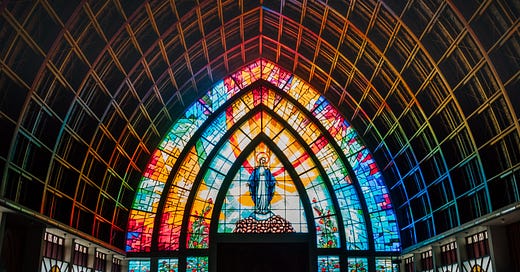Jesus and the Golden Arches
Instead of cheap toys and greasy hamburgers, my church offered children's games and after-school snacks to sell salvation
It might be sacrilegious to criticize my experience with Christianity so close to Easter, but I won’t fight inspiration when it comes. It’s a relief to have internalized a lot of my spirituality and no longer require outward validation for my beliefs and decisions.
Wishing you all a Happy Monday <3
I was rarely allowed Happy Meals as a kid, but I do have a small collection of McDonald’s-branded mini Beanie Babies tucked away somewhere in my childhood bedroom.
I obviously didn’t realize then that the toy was less of an exciting reward to a child but part of a larger manipulative marketing strategy. I understand now that few things persuade an adult into capitalism faster than the threat of an irritable, whining toddler.
My religious circles used this same tactic to sell salvation, but instead of cheap toys and greasy hamburgers, they offered after-school games and ice cream in their fellowship hall. While all of us kids were at peak sugar high, the church leaders would try and guide us through a short Bible study where we were encouraged to pray for our parents and siblings who didn’t believe in Jesus.
To instill a sense of urgency, we were often asked about how we might feel going to Heaven alone while our family members slowly melted in eternal Hellfire. This was meant to prompt us to have conversations about salvation with our families and invite them to church, but I ended up hyper-fixating on death more than I felt inspired to praise God.
I coped with this complex concept of death by making lists: one of behaviors that put me on God’s chopping block and another that would keep me safe from damnation. From a young age I clung to Christinaity like an oxygen tank because I was obsessed with being “good.” Taking the promise of eternal life too literally, I theorized that if I followed all the rules the Bible set before me, I might avoid dying altogether.
Neither of my parents forced religion on me, but I became more devout than either of them. I led all of our family’s dinner prayers and was given a lot of women’s devotional Bibles that I no longer read. By the time I was 16, I was the first person awake on a Sunday morning in my household and often sat in pews alone, prepared to summarize the sermon to my family over lunch.
As the eldest daughter, I already bore more emotional responsibility than should have been required of my age. I was the sounding board to my mom’s feelings, mediator to tense family conflict and full-time babysitter to my explosive younger sister.
Victim to this complex, my maturity was expedited in many ways, but not enough to understand boundaries and how to implement them. I was already accustomed to accepting inappropriate relational roles, so feeling spiritually responsible for my loved ones’ afterlife was another unwanted burden I assumed was mine to bear.
My current lack of religious involvement is how I’m compensating for the absence of a carefree childhood. This is truly the first season of my life where I’m not suffocated by a religious institution, and I finally feel in control of myself and my mental energy; I’m responsible for my actions but not in a constant state of fear and anxiety.
I think this is the freedom I’d always read about—the freedom God promises—and I miraculously managed to get here even when all my paths were misguided.
Photo by Eduardo Flores on Unsplash




